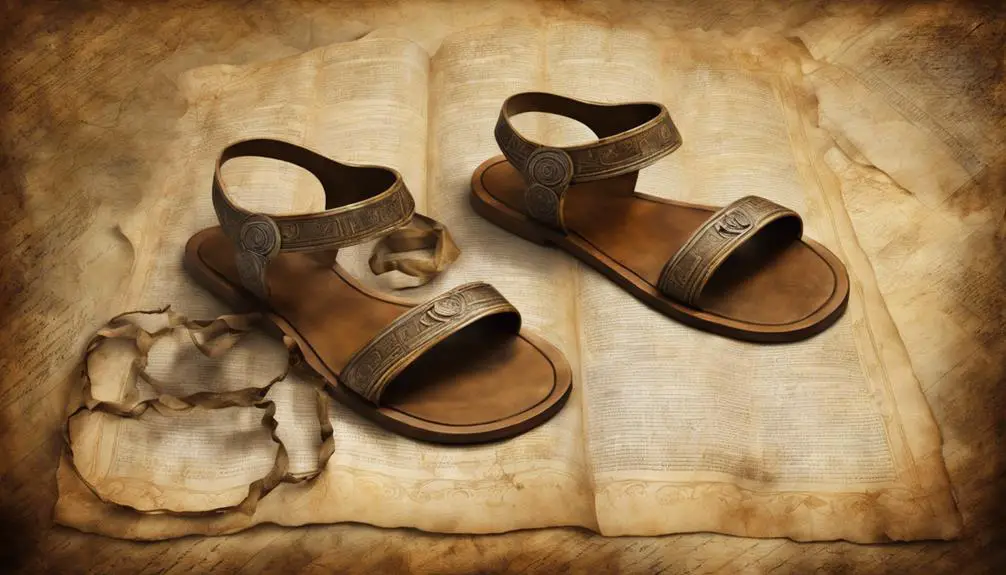Delve into the biblical term 'shod', a symbolic footwear reference that enriches our understanding of ancient scriptures.

What Does Shod Mean in the Bible
Imagine you're a time traveler, stepping into the dusty sandals of an ancient Israelite.
You'd probably be curious about the meaning of 'shod', a term often encountered in biblical texts. It's an old English word that signifies the act of wearing shoes, yet in the Bible, it carries a deeper, more symbolic meaning.
Let's take a journey through the winding roads of biblical language and explore how the term 'shod' is used, as its understanding can enrich our interpretation of various scriptural passages.
Are you ready to strap on your metaphorical sandals and commence this exploration?
Key Takeaways
- 'Shod' in the Bible signifies wearing shoes, symbolizing readiness, protection, and spiritual grounding.
- The term 'shod' evolved from Old English 'scod', contributing to its varied scriptural interpretations.
- Scriptures like Ephesians 6:15 and Exodus 12:11 use 'shod' metaphorically to emphasize readiness, urgency, and spreading good news.
- Modern Christian teachings interpret 'shod' as metaphorical preparedness, protection, and readiness in spiritual journeys.
Defining 'Shod' in Biblical Context

To fully grasp the biblical context of 'shod', you must first delve into its ancient linguistic roots and its frequent use in various Scriptures. When you explore 'shod' etymology, you'll find it's an old English term, often used in past tense, which means to wear or provide with shoes. In the Bible, particularly in the King James Version (KJV), 'shod' is frequently used to symbolize readiness, protection, or grounding.
Let's take a look at Ephesians 6:15 in the KJV: 'And your feet shod with the preparation of the gospel of peace.' The use of 'shod' here underlines the notion of being spiritually prepared, well-grounded, and protected by the Gospel's teachings.
Another instance is found in Isaiah 5:27: 'None shall be weary nor stumble among them; none shall slumber nor sleep; neither shall the girdle of their loins be loosed, nor the latchet of their shoes be broken.' Here, 'shod' is implied in the reference to shoes, again symbolizing protection and readiness.
In your journey through various Biblical translations, understanding 'shod' is essential. It's a powerful word that encapsulates a deeper spiritual meaning, emphasizing the importance of steadfastness in faith.
Origins of the Term 'Shod

Diving into the origins of 'shod', you'll discover its roots entrenched in Old English, where it served as the past tense of the verb 'to shoe.' The 'shod' etymology is fascinating, revealing how words evolve over time. It's a term that has weathered centuries, its form and usage changing while its core meaning remains consistent.
Let's break it down:
- The Old English 'scod' evolved into the Middle English 'shod', maintaining its definition as the past tense of 'to shoe.'
- 'Shod's' usage extended beyond mere footwear, taking on symbolic meanings in various contexts.
- Ancient translations of the word show us its longevity and cultural significance, like in the Old Testament, where 'shod' was often used metaphorically.
Each of these facets of 'shod's' history contributes to our understanding of its current usage, especially in scriptural contexts. Its etymology, evolution, and varied application across time and cultures enrich its meaning, adding layers of depth to its interpretation. As you continue to explore 'shod' and its significance in the Bible, remember its roots and the journey it has taken to get here. It's not just a word; it's a testament to the evolving nature of language and the enduring resonance of biblical themes.
Scriptural References to 'Shod

Now that you're familiar with the historical journey of 'shod', let's examine its specific instances and significance within the holy scriptures.
The term 'shod' is commonly used in the Bible to refer to the act of wearing shoes or sandals, an element of Biblical footwear. Its usage can be found in numerous verses, providing insight into the cultural and historical aspects of footwear in Biblical times.
For instance, in Ephesians 6:15, the 'shod' translations read, 'and having shod your feet with the preparation of the gospel of peace.' Here, the term is used metaphorically to depict the readiness and preparation of spreading the gospel.
Another instance is in Exodus 12:11, where the Israelites are instructed to eat the Passover meal 'with your loins girded, your shoes on your feet, and your staff in your hand.' This usage of 'shod' emphasizes the urgency and readiness to leave Egypt.
In Isaiah 52:7, the messengers who bring good news are described as having 'beautiful feet,' implying they're shod, ready to deliver the message.
Symbolic Significance of 'Shod

Beyond its literal meaning, 'shod' carries a rich symbolic significance in the Bible, often representing readiness, preparation, and the ability to spread the good news. This idea of Biblical Footwear isn't just a physical necessity but a profound metaphor.
The 'Shod' Metaphors embedded in scripture are packed with symbolic implications. Let's delve into a few:
- Being 'shod' with the preparation of the gospel of peace (Ephesians 6:15) – Here, shoes symbolize a readiness to spread the gospel. It's about having your feet firmly grounded in faith, ready to march forward in your spiritual journey.
- Shod and ready for service (Exodus 12:11) – In this context, shoes signify preparation for immediate action or service, highlighting the need for readiness in obedience to God's calling.
- Sandals as a symbol of power transfer (Ruth 4:7) – In this account, the act of one man giving his sandal to another was a sign of transferring rights, indicating how 'shod' could symbolize authority and legitimacy.
Analyzing these metaphors, you'll find a consistent message: the importance of being spiritually prepared, ready for action, and grounded in faith.
Shod' in Modern Christian Interpretation

While the historical and symbolic interpretations of 'shod' are deeply rooted in biblical text, it's fascinating to explore how this term is perceived and applied in the context of modern Christian teachings. Today, the modern usage of 'shod' often takes on a metaphorical sense, symbolizing preparedness in the spiritual journey.
However, there are also 'shod' misinterpretations due to the evolution of language and changing cultural contexts. Some Christians perceive it solely as a physical act of wearing footwear. This simplistic interpretation risks missing the profound spiritual implications the term holds.
To fully grasp 'shod' in its modern context, you must understand its dual role of protection and preparation. Just as shoes guard your feet against harm, being spiritually 'shod' equips you for the trials of life. This spiritual readiness is often linked to the 'Armor of God' in Ephesians 6:15, where believers are urged to have their feet shod with the readiness of the gospel of peace.
Therefore, 'shod', in modern Christian teachings, invites Christians to be vigilant and prepared in their spiritual journeys, highlighting the importance of readiness for spreading the gospel of peace.
Frequently Asked Questions
How Is the Term 'Shod' Used in Other Religious Texts Outside of the Bible?
You're asking about the term 'shod' in religious texts outside the Bible.
In Islam, 'shod' isn't typically used. However, footware symbolism does exist. For instance, removing shoes represents respect and purity in holy places.
While 'shod' itself isn't directly referenced, the symbolism of shoes, being 'shod' or not, still holds significant meaning. So, although the term 'shod' isn't common, the concept it represents is present in different forms.
Are There Any Specific Rituals or Practices in Christianity Associated With 'Shod'?
In Christianity, there aren't specific rituals associated with 'shod'. However, 'shod' symbolism is quite significant. It's often referred to in prayers and sermons, symbolizing preparation and readiness to spread the gospel of peace.
Has the Interpretation of 'Shod' Changed Over Different Periods of Christian History?
You're asking if 'shod's interpretation has evolved through Christian history. It's a complex question.
Shod's etymology traces back to Old English, meaning to provide with shoes. Over time, its biblical use as a metaphor has indeed shifted. Initially, it referred physically to sandals. Later, it took on deeper meanings, symbolizing preparedness.
How Does the Concept of 'Shod' Align With Other Similar Themes or Concepts in the Bible?
In exploring how 'shod' aligns with similar themes in the Bible, you'll notice a common thread of preparation and protection. 'Shod' symbolism often represents readiness for spiritual battles, mirroring other Biblical concepts like the 'Armor of God'.
Shod's biblical contexts emphasize the need for spiritual preparedness, echoing themes of diligence, faith, and strength in adversity. It's a compelling study of how one word can encompass such profound, interconnected themes.
Are There Any Controversies or Debates Around the Interpretation of 'Shod' Among Different Christian Denominations?
You'll find differences in how 'shod' symbolism is interpreted across Christian denominations. Some view it strictly as being prepared with the gospel of peace, others see it more broadly as readiness for spiritual warfare. It's not a major point of contention, but these interpretation variations do exist.
As with any biblical concept, it's essential to respect and understand different perspectives.
Conclusion
In conclusion, you've discovered that 'shod' in the Bible carries more than just a literal meaning of putting on shoes. It's deeply symbolic, originating from ancient language and scripture.
Whether in historical context or modern Christian interpretation, 'shod' signifies readiness, protection, and preparation for spiritual journeys. By understanding these nuances, you can deepen your biblical study and appreciation for the rich layers of meaning in every word.



Sign up